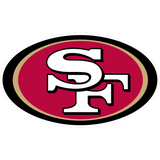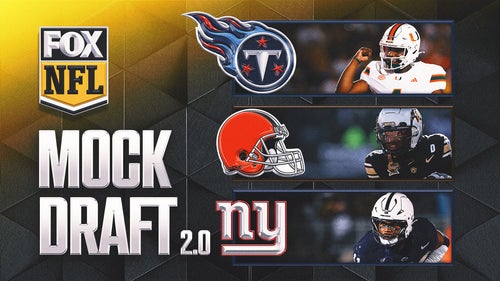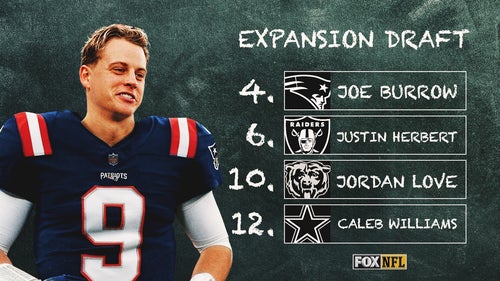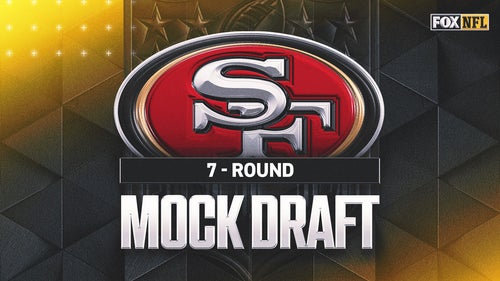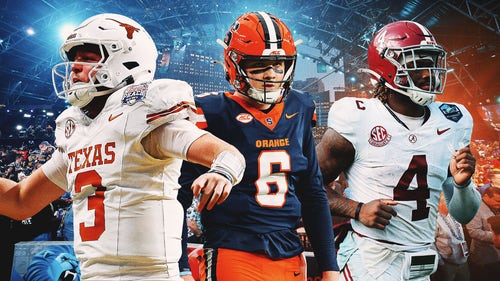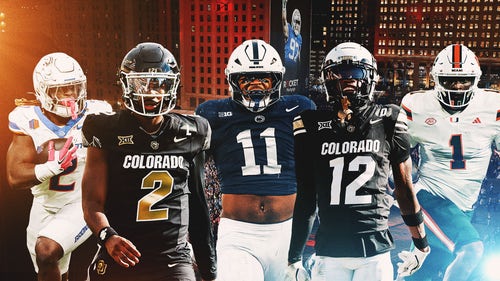
Colin Kaepernick's message is being heard loud and clear in San Francisco
The day before Monday night’s 49ers game, Reverend Dr. Amos Brown stood before his congregation at Third Baptist Church in San Francisco’s Fillmore neighborhood wearing a large red Colin Kaepernick jersey over a white dress shirt. His hair and beard covered in grey, he slowly pulled his aging body up to the pulpit, and looked out at the audience — women in their best dresses, and men in their Sunday suits — as they settled into their seats.
“We are going to let the world know we are still behind Brother Kaepernick,” he said. In front of him, seven or eight people in the audience were wearing their own red Kaepernick shirts over their dress clothes. Rev. Brown cleared his voice, then stepped away from the pulpit and took a knee. His parishioners followed suit, all kneeled and sang "The Star-Spangled Banner" in unison.
It’s hard to say what Kaepernick envisioned would happen when he silently sat down for the national anthem at a preseason game a few weeks ago. So silent, in fact, it went unnoticed the first two times he did it. It was a solitary act — a protest, he says — against police brutality and social inequality. Immediately though, when it was first publicized, his actions brought the wrath of one large swath of America, and the admiration of another. Even Donald Trump weighed in, telling him to find another country. Although many were sympathetic, Kaepernick’s peers were unwilling to join in his protest until teammate Eric Reid knelt alongside him in the last preseason game of the year. The image of the two on a knee was both vivid and active. Soon Megan Rapinoe, an openly gay women’s professional soccer player, and then a handful of high school and college athletes in Nebraska, Illinois, Minnesota, Virginia and Maryland followed suit and kneeled during playings of the anthem.
“What Kaepernick has done has reignited a movement,” Rev. Brown told me Monday in his office. “Symbolically, he’s saying, we’re not all the way up, and neither is America.”

Dr. Amos Brown isn't much of a 49ers fan, but he is now a Kaepernick devotee. (Flinder Boyd)
Born in Mississippi, Rev. Brown first arrived in San Francisco in 1956 and was immediately struck by the vibrancy of the Fillmore neighborhood. “It was a place for black cultural celebration,” he says. “It was the Harlem of the West.” In 1976 he took over as pastor at Third Baptist, the oldest African-American church in the Western United States, and over the years he watched as governmental housing policies and rapid gentrification forced almost all of the black residents of the neighborhood elsewhere, many out of San Francisco entirely. “Fillmore is no more,” he says. Those that stayed have seen the gap for median household income between white ($104,000) and African-American families ($29,500) in San Francisco dip to the worst for any major American city.
Rev. Brown — who follows the 49ers with only the occasional cursory glance — never had heard of Kaepernick before the protest. But when he was told of Kaepernick’s actions, he needed to talk to him. It was a brave act, Brown thought, and the fearlessness reminded him of fighting for civil rights decades earlier alongside Medgar Evers, and later with Martin Luther King Jr..
As one of the most prominent figures in San Francisco, Rev. Brown had a phone call set up with Kaepernick, five days after the initial protest.
“He told me, ‘I’m in this for the long haul. I’m serious and I’m committed. It’s not fair or just for young black men to be shot down,’” Brown said. He also claims he was one of the first outside of Kaepernick’s camp who was told of the QB's plan to donate $1 million to various social groups and charities. As they ended their talk, Kaepernick agreed to speak at Third Baptist Church the next Sunday, Sept. 4. Immediately, Rev. Brown announced his guest speaker and the congregation went into overdrive, getting the word out, with thousands expected to attend.
Walk a mile from Third Baptist Church and you’ll run into City Hall. There on the second floor, Supervisor Eric Mar, a slight man with jet black hair wearing a leather jacket, greets me. The former commissioner of the board of education, his constituency resides in the Richmond area of San Francisco, a primarily white and Asian neighborhood. When I tell him I want to know about Kaepernick, his eyes light up. “I’m thinking of kneeling for the pledge of allegiance at tomorrow’s floor supervisors meeting,” he says. “What do you think?”

He lost the starting job in San Francisco, but Kaepernick's stance has made him the center of fan attention once again. (Ezra Shaw/Getty Images)
Mar has spent eight years as a supervisor and gained recognition most recently by becoming the first supervisor, along with three colleagues, to successfully call for the resignation of the embattled San Francisco police chief, Greg Suhr. In May, the long-serving Suhr left office after three policemen were involved in the shooting deaths of unarmed people within six months. That was followed by a federal investigation into racist and homophobic text and email messages sent within the department. Mar, an Asian-American who moved to San Francisco from Sacramento in 1982, felt solidarity with Kaepernick’s message.
“What he’s done is very powerful,” Mar says. “He is capturing that feeling that not just African-Americans are feeling but lots of people of color. The feeling of being pushed out and controlled and not being safe. It’s a very courageous act.”
Malia Cohen, supervisor for the 10th District, overseeing San Francisco’s poorest neighborhoods in the southeastern part of the city, attended Rev. Brown’s sermon on Sept. 4, alongside former mayor Willie Brown. A teacher from Mission High School in San Francisco brought 11 students to see Kaepernick speak. The old two-tiered auditorium was nearly full, buzzing with excitement.
Amos Brown, in a Kaepernick jersey that day as well, had met with Police Officers Association President Martin Halloran — who just days earlier had publicly condemned Kaepernick’s choice of words and his socks, which seemed to show pigs wearing policeman caps. Brown wouldn’t say if he spoke to Halloran about the Kaepernick situation, saying only that Halloran had agreed to support Toney Chaplin to become the one of city’s first black police chiefs.
As the congregation filled their seats at Third Baptist, Amos Brown got a call from Kaepernick’s manager. Kaepernick had to cancel, citing the “rigors of training,” as Brown put it. Some were visibly upset, including the students from Mission High School. Regardless, there was a movement now in place, and not just inside sports arenas.

Kaepernick's kneel-down on Monday took place just a few feet from where military members held the American flag. (Kirby Lee/USA TODAY Sports)
Brown delivered his sermon anyway, and promised Kaepernick would be back at a future date. “As we know, the season is coming up.”
As the clock inside Levi’s Stadium ticked down toward the national anthem on Monday night, fans gathered along the railing, rubber-necking toward the 49ers bench. The spectacle of watching a man take a knee for two and half minutes almost brought as much anticipation as the opening kickoff.
Near the concession stand, a group of three men stood together. Mike from Pleasant Hill in a Patrick Willis jersey clutched a beer. “For me, if Kaepernick plays,” he said when I asked his opinion of the situation, “if he gets the starting job back, then I’m never coming back to a game. I hate the guy. Hate. Him.” He raises his cup and his friends laugh.
Just beside him, a man in his 20s named Gustavo from Fresno wore a Kaepernick jersey, looking onto the field as a giant American flag was unfurled. “I’m a vet,” he said, pulling his dog-chain from under the jersey. “I’ll always stand for the anthem, but I’m proud that I fought for his rights. That’s why I wear this jersey.”
As the 49ers’ first regular-season game was nearing kickoff, there was a moment of silence for the victims of 9/11, then the start of the anthem. Some fans stood with their hands on their hearts and sang each word, others stood tall, and in Section 131, four people sat down. On the field Kaepernick again knelt with Reid, while Antoine Bethea and Eli Harold stood with fists raised. It seemed every movement and conscious action was a political statement.
When the song ended, I walked over to a couple who had each made different choices. The woman sat, while her boyfriend stood during the anthem.

San Francisco Supervisor Eric Mar sported a Kaepernick jersey at City Hall.
“This is deeper than this game, or one song,” Dominique Smith from Sacramento said. “I’m sitting to express my frustration in our system.” Next to her, Alton Williams was still standing, and beaming as the game started.
“I was sitting down and I got up to see if I could spot Kaepernick. Then I was overcome by the moment, by emotion,” he said. “But it also made me feel really powerful. I could decide to sit or stand, or I could sit, then stand.”
Eventually Kaepernick did get into the game late in the fourth quarter, and handed the ball off three times during the blowout 28-0 win over the Los Angeles Rams. The home crowd seemed to boo his every move, then chants of “U-S-A!” rang out. When the game was over, fans shuttled out of the stadium, headed back to their cars. When I reached my car, my phone buzzed. It was Eric Mar, from City Hall. He sent me a picture of a new red No. 7 Kaepernick jersey he proudly held over his chest.
“I’m wearing it tomorrow at City Hall,” he said. “It’s important that we support this brave young man.”
